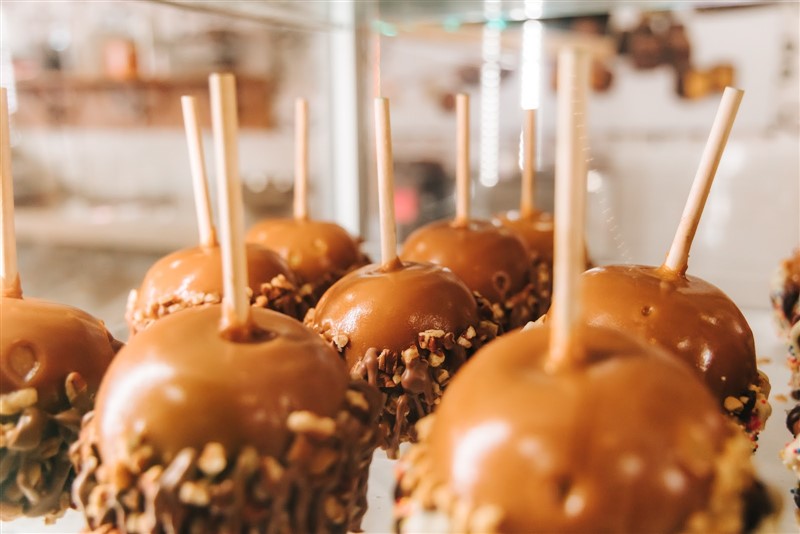Caramel is the standard spelling for the color, taste, or candy produced from cooking sugar or syrup. Carmel is a common misspelling of caramel.
-
 Alanna Madden
Alanna Madden
-
 February 1, 2021
February 1, 2021
-
 Grammar Tips
Grammar Tips
 February 1, 2021
February 1, 2021
 Grammar Tips
Grammar Tips
Caramel is the standard spelling for the color, taste, or candy produced from cooking sugar or syrup. Carmel is a common misspelling of caramel.
In the United States, it’s completely normal to pronounce caramel as “karh-mel or “care-a-mul.” In fact, most people would understand if you wrote caramel as “carmel,” even though these terms have nothing to do with each other.
As noted by Garner’s Modern English Usage, “caramel” is the standard spelling for any burnt sugar that adds a light brown-hue, sweetens food items, or creates a “smooth, chewy, caramel-flavored candy” (Garner 145).
Meanwhile, the noun “Carmel” exclusively references Mount Carmel of modern-day Israel, whose religious affiliations extend to the names of Carmel, California, and Carmel, Indiana.

The word caramel is a noun that references a type of flavoring, color, or sweet treat. More specifically, the New Oxford English Dictionary defines the noun caramel as a “sugar or syrup heated until it turns brown used as a flavoring or coloring for food or drinks” (“Caramel” 260). For this sense, English speakers may use caramel in sentences like:
The light brown color we associate with caramel occurs from cooking sugar or syrup and is similar to hues like “hazel,” “chocolate,” “coffee,” or “cocoa.” Sentence examples include:
Lastly, English speakers can use the noun caramel to reference the soft candy composed of sugar and butter that has been melted and reheated (260). For example,
The French word caramel (‘burnt sugar’) entered the English language in the 18th century and originated from Spanish caramelo (260). The origins of caramelo are not well-documented, but the Online Etymology Dictionary believes it may come from Medieval Latin cannamellis from Latin canna and mellis (related to ‘honey’), or Latin calamus (‘reed’ or ‘cane’).
The word Carmel is a proper noun that references several geographical areas, but the most prominent is Mount Carmel, a coastal mountain range in northern Israel. The culturally significant region shares religious ties to Jewish, Islamic, and Christian faiths, although it is often affiliated with historical wartime events between the 15th century and the first World War.
“Carmel” is also known as a biblical settlement in Judea (Palestine) and a nearby Israeli settlement located in the West Bank (est. 1980). However, the biblical affiliations of Mount Carmel went on to inspire the names of two U.S. cities, such as Carmel, Indiana (originally called “Bethlehem”), and Carmel, California (also known as Carmel-by-the-Sea).

It’s truly no wonder why so many people confuse the spellings of carmel and caramel, as both words have several different pronunciations between the United States and the United Kingdom. Let’s take a look:
Common pronunciations of caramel candy or colors vary by dialect in the U.S., but they are largely the same in the U.K.:
Since American and British English pronounce caramel differently, you can expect differences for “caramelize,” too:
If you’re discussing Mount Carmel (of the Middle East), there are also differences in pronunciation between American English and British English:
The Carmels of California and Indiana are named after the religious affiliations of Mount Carmel, but that doesn’t mean they share common pronunciations:
The noun pecan is another dessert-related term that causes quite a stir amongst English speakers. We often hear “pecan” in reference to beloved dessert toppings or ingredients in phrases like “chocolate pecan pie,” “pecan pralines,” or “butter pecan ice cream.” But as common as these desserts are, not everyone pronounces “pecan” the same.
As demonstrated by Merriam-Webster’s Dictionary, the three most common American pronunciations of pecan are:
So, which is correct? Millican Pecan, a Texas pecan distributor, states “pa-kahn” is the correct pronunciation of “pecan” and that “pee-can” is the second-most-common form. But while Millican’s blog argues that neither variant is affected by one’s regional dialect, that doesn’t mean the British pronounce “pecan” the same.
According to Lexico, standard British pronunciations of “pecan” include:
Of course, a British accent can make any American term sound different, so there’s no need to toil over their differences. But since “pecan” originates from French pacane (from Illinois, that is), we suggest sticking to Millican’s recommendation of “pa-kahn.”
Carmel and caramel are two of the most common nouns to confuse, so make sure you know their differences with the following multiple-choice questions.
Answers